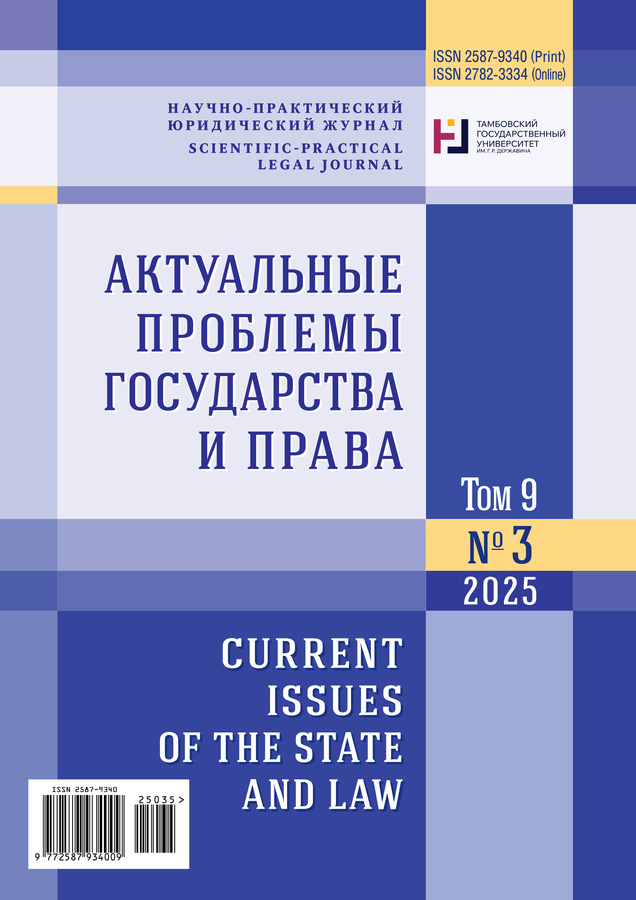ПРИНЦИПЫ ГРАЖДАНСКОГО ПРОЦЕССУАЛЬНОГО ЗАКОНОДАТЕЛЬСТВА РОССИИ ВО ВТОРОЙ ПОЛОВИНЕ XIX ВЕКА
- Авторы: Демичев А.А.1,2
-
Учреждения:
- ФГБОУ ВО «Российская академия народного хозяйства и государственной службы при Президенте Российской Федерации»
- ФГКОУ ВО «Нижегородская академия министерства внутренних дел Российской Федерации»
- Выпуск: Том 5, № 18 (2021)
- Страницы: 214-225
- Раздел: Общая теория и история права и государства
- URL: https://bakhtiniada.ru/2587-9340/article/view/303955
- ID: 303955
Цитировать
Полный текст
Аннотация
Исходя из позитивистского понимания принципов права, проанализировано законодательство Российской империи, нормативно закрепляющее принципы гражданского процессуального права. Обосновано положение, что в дореволюционной доктрине имелись определенные представления о принципах гражданского процессуального законодательства, однако специальный анализ нормативных актов с целью их выявлениях не проводился. Выделены особенности работ дореволюционных ученых – специалистов в области гражданского процессуального права, а именно: теоретизированность, рассуждения о принципах гражданского процесса «вообще» как неких универсальных идеях в отрыве от реального анализа Устава гражданского судопроизводства, «вписывание» российского гражданского процессуального права в общеевропейский контекст и как следствие этого использование широкого круга иностранной литературы. На основе анализа Устава гражданского судопроизводства 1864 г. и Именного указа, данного Сенату «Об учреждении судебных установлений и о Судебных уставах» от 20 ноября 1864 г., обосновано и сделан вывод, что в законодательстве Российской империи было закреплено семь принципов гражданского процессуального права: 1) принцип независимости судей; 2) принцип равенства всех перед судом; 3) принцип состязательности; 4) принцип гуманизма; 5) принцип справедливости; 6) принцип гласности; 7) принцип быстроты судопроизводства (принцип рассмотрения дела по существу не более чем в двух инстанциях).
Об авторах
Алексей Андреевич Демичев
ФГБОУ ВО «Российская академия народного хозяйства и государственной службы при Президенте Российской Федерации»; ФГКОУ ВО «Нижегородская академия министерства внутренних дел Российской Федерации»
Автор, ответственный за переписку.
Email: aadem@bk.ru
ORCID iD: 0000-0002-9779-100X
доктор юридических наук, кандидат исторических наук, профессор, почетный работник высшего профессионального образования Российской Федерации, главный научный сотрудник научного центра; профессор кафедры гражданского права и процесса
Россия, 119571, Российская Федерация, г. Москва, пр-т Вернадского, 82; 603950, Российская Федерация, г. Нижний Новгород, Анкудиновское шоссе, 3Список литературы
- Сахнова Т.В. О принципах цивилистического процесса (в контексте «европеизации» процессуального права) // Российский ежегодник гражданского и арбитражного процесса. 2009. № 7. С. 44-53.
- Багаутдинов Р.Р. Принципы цивилистического процесса в контексте унификации норм гражданского и арбитражного процессов в Российской Федерации // Юридические исследования. 2017. № 4. С. 1-7.
- Плешанов А.Г. Развитие принципов цивилистического процесса в свете намечающейся реформы процессуального законодательства России // Электронное приложение к Российскому юридическому журналу. 2018. № 3. С. 42-49.
- Зарубина М.Н. Социальная роль общеправовых принципов в современном цивилистическом процессе // Арбитражный и гражданский процесс. 2021. № 4. С. 3-7.
- Станишевская Л.П. Устав гражданского судопроизводства как символ судебной реформы 1864 г. // Вестник Белорусского государственного экономического университета. 2015. № 6 (113). С. 110-116.
- Малышев К. Курс гражданского судопроизводства. Спб.: Тип. М.М. Стасюлевича, 1876. Т. 1. 454 с.
- Илюхина В.А. Принципы гражданского процессуального права России: позитивистский подход // Актуальные проблемы государства и права. 2020. Т. 4. № 16. С. 515-522. https://doi.org/10.20310/2587-9340-2020-4-16-515-522
- Илюхина В.А. Принципы гражданского процессуального законодательства РСФСР (историко-правовой анализ ГПК РСФСР 1923 г. и ГПК РСФСР 1964 г.) // Историко-правовые проблемы: Новый ракурс. 2019. № 2. С. 55-59.
- Сахапов Р.Р. Определение принципов права в дореволюционной литературе // Ученые записки Казанского государственного университета. Серия: Гуманитарные науки. 2007. Т. 149. № 6. С. 13-15.
- Нефедьев Е.А. Основные начала гражданского судопроизводства: Речь, произнесенная в торжественном годичном собрании Императорского Казанского университета, 5 ноября 1895 года. Казань: Типо-литография Императорского ун-та, 1895. 464 с.
- Яблочков Т.М. К учению об основных принципах гражданского процесса // Памяти профессора Габриеля Феликсовича Шершеневича: сб. ст. по гражданскому и торговому праву. М.: Изд. Братьев Башмаковых, 1915. С. 275-318.
- Васьковский Е.В. Курс гражданского процесса: Субъекты и объекты процесса, процессуальные отношения и действия. М.: Статут, 2016. 624 с.
- Васьковский Е.В. Учебник русского гражданского процесса. 2-е изд., перераб. М.: Изд. братьев Башмаковых, 1917. 429 с.
- Илюхина В.А. Доктринальные принципы права: понятие и специфика // Актуальные проблемы государства и права. 2021. Т. 5. № 17. С. 9-21. https://doi.org/10.20310/2587-9340-2021-5-17-9-21
- Илюхин А.В. Эволюция идеи суда присяжных в России во второй половине XVIII – первой половине 60-х гг. XIX в. (историко-правовое исследование): автореф. дис. … канд. юрид. наук. Владимир, 2006. 26 с.
- Илюхин А.В. Общественное обсуждение законопроектов в России (на примере законотворческого процесса в отношении суда присяжных): историко-правовой аспект // История государства и права. 2012. № 5. С. 11-15.
- Илюхин А.В. Идея суда присяжных в конституционной мысли России: история и современность // Историко-правовые проблемы: новый ракурс. 2019. № 1. С. 23-37.
- Илюхина В.А. «Основные положения преобразования судебной части в России» 1862 г. об институте мировых судей // Вестник Владимирского юридического института. 2009. № 4 (13). С. 181-184.
- Илюхина В.А. Эволюция идеи мирового суда в отечественной историко-правовой мысли (вторая половина XVII – первая половина XIX века) // Юридическая наука и практика: Вестник Нижегородской академии МВД России. 2011. № 1 (14). С. 33-38.
- Илюхина В.А. Эволюция идеи мирового суда в России во второй половине XVIII – первой половине 60-х гг. XIX в. (историко-правовое исследование): автореф. дис. … канд. юрид. наук. Владимир, 2012. 25 с.
- Большакова В.М. Принципы организации судебной системы Российской империи в 1864–1917 гг. // Вестник Владимирского юридического института. 2020. № 3. С. 165-170.
Дополнительные файлы










